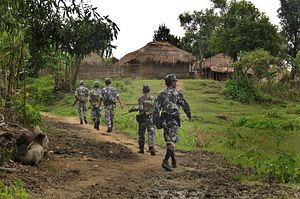Over the weekend, Chinese state media reported on the results of another recent joint drug operation that had been conducted between China and Myanmar. Though the operation is indicative of continued efforts by both sides to crack down on the problem, it also obscures the sheer magnitude of the problem and the limits of a focus on the punitive aspects of government responses.
As I’ve written previously in these pages, the China-Myanmar border is a sensitive issue for both countries. Though both countries desire stability along their 2,200 kilometer border, which also hosts the border trade that is important to southwestern Yunnan province and Chinese nationals in Myanmar, it is also frequently plagued by conflict, drugs, and disease.
Within the context of the China-Myanmar border, the media headlines usually focus on the occasional spilling over of conflict between the Myanmar government and ethnic militias in northern Myanmar, which can lead to some tensions between Beijing and Naypyidaw, or the holding of specific military drills, or even the potential for greater economic cooperation in the context of closer Sino-Myanmar ties in the wake of the Rohingya crisis. But drugs are a major challenge too, since the areas within which it plays out are part of the notorious Golden Triangle, long a key hub for mainland Southeast Asia’s drug trade, and Myanmar itself remains one of the world’s biggest producers of various kinds of illegal drugs.
Both sides have been trying to step up efforts to eradicate the problem on their own as well as bilaterally and multilaterally. And though there are wider initiatives underway in several areas, including the Myanmar government’s attempts to develop a more comprehensive national drug policy and its cooperation with international partners on aspects of law enforcement training and intelligence-sharing, the media attention has unsurprisingly been on kinetic, punitive initiatives such as joint drug operations, seizures, arrests, and large, organized incinerations of drugs.
Governments, for their part, are happy to play up these operations too as part of their efforts to boost security, though they are fully aware of both the magnitude of the actual challenge they confront as well as the difficulties of addressing it, with the cross-border drug problem often intertwined with broader dynamics, be it corruption within the security forces, conflict in areas like Shan state and Kachin state, and outstanding reforms needed in areas like rehabilitation. Last June, in conjunction with the International Day Against Drug Abuse and Illicit Trafficking, the Myanmar government touted the fact that the burnings of hundreds of millions of dollars in drugs constituted the biggest burning of seized drugs in the country’s history.
That continues to be the case. In just the past few weeks, Chinese state media have reported on several cross-border drug smuggling cases involving Myanmar in several provinces including Yunnan, Guangdong, and Jiangxi provinces which have involved suspects transiting between both countries as part of broader networks. The drugs involved have included heroin as well as “yaba,” a Thai word which translates to “crazy medicine” which is characterized as a combination of methamphetamine and caffeine.
On January 6, Chinese state media reported on the results of yet another China-Myanmar drug joint operation. According to Xinhua, the drug control bureau at the public security department of Yunnan province had cited the arrest of three suspects – two from China and one from Myanmar – and the seizure of 160 kilograms of drugs.
The account went on to laud the success of the operation within the context of several cases that both countries had witnessed recently. But, as ever, for seasoned observers, the reality is that the significance of these individual operations and crackdowns by governments continue to pale in comparison to both the magnitude and the multidimensionality of the overall challenge.

































